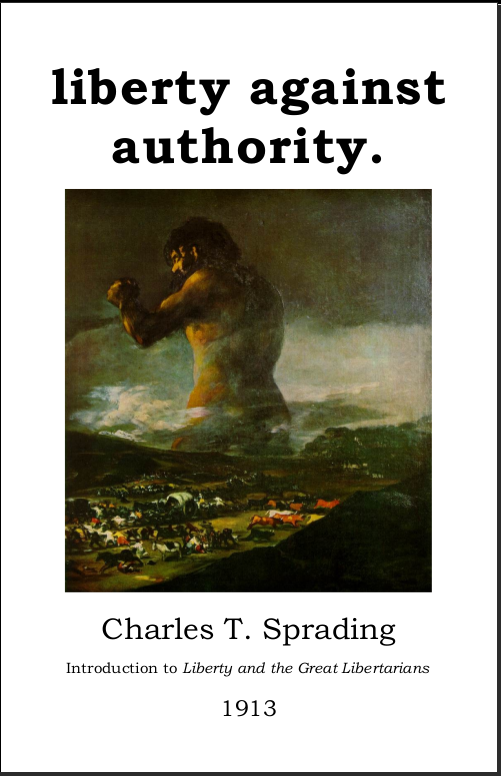C4SS has teamed up with the Distro of the Libertarian Left. The Distro produces and distribute zines and booklets on anarchism, market anarchist theory, counter-economics, and other movements for liberation. For every copy of Charles T. Sprading’s “Liberty Against Authority” that you purchase through the Distro, C4SS will receive a percentage. Support C4SS with Charles T. Sprading’s “Liberty Against Authority“.
$2.00 for the first copy. $1.50 for every additional copy.
This classic text is drawn from the Introduction to individualist anarchist Charles T. Sprading’s anthology Liberty and the Great Libertarians (1913). Sprading’s anthology was a key early source for popularizing the term “libertarian” among American antistatists.
“THE NATURAL LAW OF EVOLUTION, OF DEVELOPMENT, IS VARIATION, DIFFERENTIATION; statute law is intended to produce similarity and uniformity. . . . In the animal world, when the law of variation produces an animal differing somewhat from its kind, whether it be in different physical characteristics, to more perfectly adapt it to its environment, or in the addition of new organs to adapt it to a different environment, it is permitted by others of its species to live and propagate its kind, and often produces an entirely new and higher type of animal. But how do upholders of statute law act towards those who differ from them? Let the treatment accorded a Jesus, a Bruno, a Ferrer, be the answer. Statute law is not based on natural law; they are the antithesis of each other. . .
“THE DISTINGUISHING CHARACTERISTIC OF THE MILITANT CLASS IS PARASITISM: the power and the ability to destroy, to wage war and levy tribute, to impose arbitrary restrictions and collect taxes, to take and to consume; in short to govern. For countless ages the industrial class has been oppressed and despoiled by the militant class, but now it is coming into its own, and holds the future of the race in its hands. The industrial class possesses one power that is distinctively and exclusively its own: it is an economic power: the industrial class produces all, builds all, exchanges all. The realization of its irresistible power and the knowledge of how to use it will bring its emancipation. When the workingman realizes that war does not benefit him, but robs him, the militant class will not be able to hire him or force him to go to war; and if the industrial class refuses to use its economic power for the benefit of militant parasites, one of these classes must disappear—and it will not be the industrial!”
The introductory essay reprinted in this booklet is the Introduction to Charles T. Sprading’s anthology, Liberty and the Great Libertarians: An Anthology on Liberty, a Hand-book of Freedom (1913). The text in this booklet, originally written in 1913, is based on the public-domain copy of Sprading’s first, self-published edition, in the Internet Archive at archive.org. Charles T. Sprading (1871-1959) was a transitional figure in American libertarian writing. Born a generation later than leading individualists and mutualists such as Benjamin R. Tucker (1854-1939) and Dyer D. Lum (1839-1893), it fell to Sprading, along with Clarence L. Swartz (1868-1936), Laurance Labadie (1898-1975), and a few other writers of their cohort to keep the torch of individualist anarchism alight during the dark years of the interwar period. Sprading, working together with Swartz, joined a series of Anarchist discussion groups in Los Angeles, including the Los Angeles Liberal Club and the Libertarian League. Liberty and the Great Libertarians, one of his earliest books, was an anthology collecting arguments, shorter quotations, and biographies, on about thirty thinkers whose work touched on anarchism, individual liberty, or freethought, including William Lloyd Garrison, Tucker, Spooner, Kropotkin, Josiah Warren, and William Godwin, alongside quotes from Paine, Jefferson, and Lincoln. His book, along with the activity and publishing of the Libertarian League, played a major role in keeping the literature of anti-statism active after the retirement of Tucker and the death or exile of many other leading Anarchist figures; they also played a major role in popularizing the term “libertarian” among American anti-statist writers. Sprading continued writing and publishing until his death in 1959, with works such as Equal Freedom and Its Friends (ca. 1920), Mutual Service and Cooperation (1930), and Real Freedom (1954).








